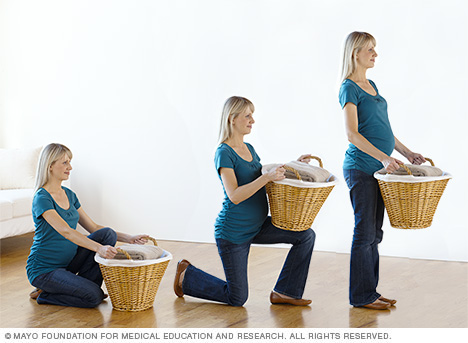Working during pregnancy: Do's and don'ts
Most people can continue working during pregnancy. Being pregnant, however, might present challenges in the workplace. To stay healthy and productive on the job, you need to understand how to relieve common pregnancy discomforts — and know when a work task might jeopardize the pregnancy.
Easing nausea and vomiting
It's called "morning" sickness, but pregnancy queasiness can hit at any time. To ease nausea at work:
- Avoid nausea triggers. Whether it's the smell of foods in the break room or other odors or tastes, steer clear of anything that triggers nausea.
- Snack often. Crackers and other bland foods can be lifesavers during nausea. Keep a stash at work for easy snacking. Ginger ale made with real ginger or ginger tea might help, too.
- Take vitamin B-6. This is considered safe during pregnancy and is easily available. It might help quell nausea. Adding doxylamine (Unisom) or diphenhydramine at bedtime can also help. But it's better not to take them during the day because they can cause sleepiness.
- Ask about prescription anti-nausea medications. For severe nausea and vomiting with weight loss, your health care provider might be able to prescribe medication.
Handling fatigue
The body working overtime to support a pregnancy might cause tiredness — and resting during the workday can be tough. It might help to:
- Eat foods rich in iron and protein. Fatigue can be a symptom of iron deficiency anemia but adjusting your diet can help. Choose foods such as lean red meat, poultry, seafood, leafy green vegetables, iron-fortified whole-grain cereal and beans.
- Take short, frequent breaks. Getting up and moving around for a few minutes can be helpful. Spending a few minutes with lights off, eyes shut and feet up also might help.
- Drink plenty of fluids. Keep a water bottle nearby and sip throughout the day. Drink earlier in the day rather than near bedtime to cut down on trips to the bathroom interrupting sleep.
- Cut back on activities. Scaling back on nonwork activities might create more time to rest after work. Consider shopping online or hiring someone to clean your house or take care of the yard.
- Keep up a fitness routine. Physical activity can help boost energy levels — especially for those who sit at a desk all day. Take a walk after work or join a prenatal fitness class, as long as your health care provider says it's OK.
- Go to bed early. Aim for at least eight hours of sleep every night. Resting on the left or right side will keep blood flowing well to the baby and ease swelling. For added comfort, place pillows between the legs and under the belly.
Staying comfortable
As pregnancy progresses, everyday activities such as sitting and standing can become uncomfortable. Short, frequent breaks can combat fatigue. Moving around every few hours also can ease muscle tension and help prevent fluid buildup in the legs and feet. Try these other strategies, too:
- Sitting. Using an adjustable chair with good lower back support can make long hours of sitting much easier — especially as body weight and posture change. For chairs that aren't adjustable, use a small pillow or cushion to provide extra support for the back. Elevate the legs to decrease swelling.
- Standing. For those who must stand for long periods, putting one foot up on a footrest, low stool or box can help. Switch feet every so often and take frequent breaks. Wear comfortable shoes with good arch support. Consider wearing support or compression hose.
- Bending and lifting. Even when lifting something light, proper form can spare the back. Bend at the knees, not at the waist. Keep the load close to the body, lifting with the legs — not the back. Avoid twisting the body while lifting.

To lift correctly, bend at your knees — not at your waist. Keep your back as straight as possible. Use your leg muscles to stand, keeping the object close to your body.
Keeping stress under control
Stress on the job can sap needed energy. To minimize workplace stress:
- Take control. Make daily to-do lists and prioritize tasks. Consider what to delegate to someone — or eliminate.
- Talk it out. Share frustrations with a supportive co-worker, friend or loved one.
- Relax. Practice relaxation techniques, such as breathing slowly or imagining a calm place. Mindfulness and meditation apps might be helpful. Try a prenatal yoga class, as long as your health care provider says it's OK.
Taking proper job precautions
Certain working conditions might increase the risk of complications during pregnancy — especially for those at high risk of preterm labor. Those working conditions include:
- Exposure to harmful substances
- Prolonged standing
- Heavy lifting, climbing or carrying
- Excessive noise
- Extreme temperatures
Also, getting vaccinations recommended by your health care provider will help keep you safe at work and home.
If you're concerned about any of these issues, mention it to your health care provider. Together you can decide if you need to take special precautions or modify your work duties during your pregnancy.
Last Updated Mar 7, 2024
© 2024 Mayo Foundation for Medical Education and Research (MFMER). All rights reserved. Terms of Use



